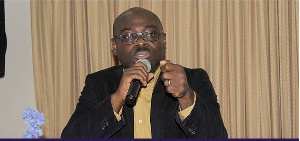Opinions of Saturday, 1 January 2011
Columnist: Okoampa-Ahoofe, Kwame
What is Rictus?
By Kwame Okoampa-Ahoofe, Jr., Ph.D.
I had almost forgotten the meaning of the word “rictus,” which I learned some three decades ago, at Okwawu-Nkwatia’s St. Peter’s Secondary School (PERSCO), until the patently retching and outright unsightly picture of what clearly appeared to be a human face with a wide-open mouth charged at me on the website of leading Ghanaian radio station MyJoyOnline.com.
Moments like this particular one, which came with the caption of “The World’s Widest Mouth” (10/29/10), sobers me into confronting the grim reality of humans as a bona fide part of the proverbial “Animal Kingdom,” of the kind which Kofi Jakpasu rapturously instructed us at PERSCO.
Interestingly, it is not his remarkable flair as a Biology teacher that has etched the man’s name almost indelibly into my mnemonic bank, but a clearly snarky remark that he once made in class, regarding the conjugal protocol of the Akan. In essence, Kofi Jakpasu had risibly convinced himself that the conjugal rule among the Akan verged on the outright incestuous. He had uttered something to the following effect: “You people have a lot of physical diseases because unlike us, Ewes, you prefer to marry your first cousins and other close relatives.”
Naturally, some of my classmates thought that such remark smacked of insufferable arrogance of a bewildering kind. More so, because those of us who hailed from families with several Ewe farm-keepers and laborers had witnessed on more than several occasions, how “our Ewes” almost hermetically “conjugated” among themselves.
Not long before, for instance, one of the Ahiabor girls who lived on my late great-grandfather’s estate at Akyem-Asiakwa, had been married off to a man freshly “imported” from Eweland scarcely after she graduated the tenth grade or form four. We had all been of the quite plausible view that she would marry a recently deceased cousin of mine who had been dating Victoria for quite awhile. What made the situation rather embarrassing for me, though, was the fact that Victoria’s immediate younger brother, Clement, was a classmate and my friend.
On several occasions when I would accompany my mulatto uncle, Wofa Yaw Broni Nketia, to the farm, on our return home from the farm, which was a little over a mile from the Ahiabor hamlet, we would break for a meal voluntarily and specially prepared for us by Victoria, on the express instruction of her father, Togbui “Redface” Ahiabor. The latter, as also almost all his five or six children, was a brown-skinned man and a few shades darker than my half-Austrian uncle. I highlight this fact because both Togbui Ahiabor and Wofa Yaw Broni appeared to harbor a remarkable affinity for one another, obviously because they seemed to recognize in their unusually light complexions a sort of kinship which transcended the fact of one’s being Akan and the other Ewe.
Back then, as I vividly recall, the basic notion of us all being Africans with a common destiny did not seem to hold much capital, President Nkrumah’s purportedly trenchant pan-Africanist agenda notwithstanding. In sum, for Wofa Yaw Broni Nketia and Togbui “Redface” Ahiabor, it appeared that whatever they both had by way of Europe was more coherent than that which Africa provided. And, perhaps, such irony was all the more to be expected. What with a seemingly perennial cross-cultural rhetoric that invariably verged on incrimination and recrimination. If, indeed, the Ewe thought of the Akan in terms of privilege and exploitation, then, of course, it perfectly stood to reason for us Akan, in turn, to envisage the Ewe as a people perpetually on the prowl to seize, albeit diplomatically, and then obdurately claim as their own.
Anyway, the meals, such as Victoria prepared for us, consisted of boiled cassava, plantains and cocoyams, severally or collectively, with cocoyam-leaf stew and salted fish to smoothen it down. Sometimes it would be tomato-and-hot-pepper stew with palm-oil and salted fish or imported sardines in oil. Victoria was undoubtedly a great cook, though one also had the feeling that being famished contributed no less to ensure that Victoria would be reckoned among the vanguard ranks of great cooks.
On another level, however, it appears that Togbui “Redface” Ahiabor and Wofa Yaw Broni Nketia got along exceptionally well because my mulatto uncle spoke Ewe with a modicum of fluency – even eloquence – that made even native Ewe speakers doubt his claim to have picked up that remarkably difficult language as a full-fledged adult. Clement Ahiabor, my friend and classmate and Victoria’s younger brother, even sneered the very first time that I introduced Wofa Yaw Broni Nketia to him as my maternal uncle.
“You damn liar, Kwame. How could this half-white man be your uncle?” Clement had winced. It would not be until my uncle introduced me to Togbui “Redface” Ahiabor as his nephew, in the Ewe language, that my classmate accepted the same.
Anyway, when I first saw the picture of a man with the gaping mouth of a whale and the rather sensational caption of “The World’s Widest Mouth,” my gut reaction was to question the taste of any editor who would publish such an offensively visceral display of any aspect of the human anatomy, and especially a wide-open mouth. The first impression, to me, that Mr. Francisco Domingo Joaquim’s buccal-cavity display inspired in the critical observer’s mind’s eye was the mouth of a frog, which was why I scurried to the lavatory retching.
Fortunately, my last meal had been had nearly five or six hours before; and so nothing but a slight streak of phlegm-flavored saliva jetted out.
The article itself was rather brief and poignant. “Francisco Domingo Joaquim, 20 – a.k.a. the Angolan Jaw of Awe – can fit a 330ml can of pop [soda] into his mouth – sideways. ¶ He can stretch his mouth more than six-and-a-half inches wide, and recently put his skills to the test at the Big Mouth Competition in Rome.”
Something more refreshing from Angola this time around, however disgustingly bizarre, besides the usual tired fare of war and mayhem and amputees and child witchcraft suspects being punitively crushed like half-boiled tomatoes meant for a pot of soup. Yes, something more refreshing for the Guiness Book of World Records; and “a dream come true,” indeed, for Mr. Francisco Domingo Joaquim.
[Dedicated to My Most Favorite Uncle: Mr. Isaac “Yaw Broni” Nketia, 1933-2010]
*Kwame Okoampa-Ahoofe, Jr., Ph.D., is Associate Professor of English, Journalism and Creative Writing at Nassau Community College of the State University of New York, Garden City. He is a Governing Board Member of the Accra-based Danquah Institute (DI) and the author of “Crosscurrents” (Atumpan Publications/Lulu.com, 2008). E-mail: okoampaahoofe@optimum.net.
###












